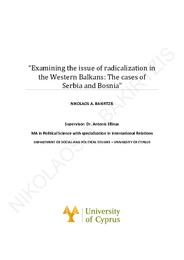“Examining the issue of radicalization in the Western Balkans: The cases of Serbia and Bosnia”

View/
Date
2021-05-27Author
Bakirtzis, Nikolaos A.Publisher
Πανεπιστήμιο Κύπρου, Σχολή Κοινωνικών Επιστημών και Επιστημών Αγωγής / University of Cyprus, Faculty of Social Sciences and EducationPlace of publication
CyprusGoogle Scholar check
Keyword(s):
Metadata
Show full item recordAbstract
My aim is to examine radicalization in the Western Balkans by qualitatively comparing Serbia and Bosnia and Herzegovina. I intend to analyze religious and nationalist radicalization in the two countries, examine specific actors regarding each case and the factors that lead to their emergence, rise and potential consolidation. The data that I have collected is based on material published by the actors examined as well as secondary sources such as the existing literature regarding radicalization and extremism, journal articles, conference papers and proceedings, material published by national and international institutions such as reports by think tanks and political organizations, newspapers and sources such as the European Western Balkans, Balkan Insight and Balkan Investigative Reporting Network.
I first review of the literature on radicalization and related terms such as extremism, ethno-nationalism, Far-Right and Islamist radicalization. I will focus on the different interpretations and definitions given by various scholars and institutions before presenting the working definition of this thesis by McCauley and Mosalenko. Moving on, I will address the situation in the context of Serbia and Bosnia by making an overview of the phenomena, the factors that fuel radicalization, the actors, their ideology, aims, and ties and how the radicalization process occurs in each context.
Serbia is the country in the Balkans where ethno-nationalism has the deepest roots. The presence of ethno-nationalist actors in Serbia, both institutional as well as non-institutional, is the strongest among the ex-Yugoslav states. The one actor that is examined is the Serbian Radical Party (SRS) of Vojislav Šešelj, an institutional extreme right party and the most successful electorally party of the Far-Right family in Serbia and the Balkans. My focus is on the factors that led to its emergence in the early 90s, its ideology and political aims. The second actor is extremist militant Serbian Action (SA), a non-institutional actor that belongs to the “new wave” of Serbian ethno-nationalist actors which emerged in the late 2000s and whose ideology is based on traditional Serbian nationalism, the legacy of the wars of the 90s, a sense of victimhood as a result of Serbia’s humiliation along with neo-fascist and neo-Nazi elements.
Regarding Bosnia, the country with the largest Muslim majority and overall significant religious and ethnic diversity, I will focus on the issue of religious radicalization and more particularly Islamist radicalization and ultraconservative and radical ideologies such as Salafism and Takfirism.
I conclude my research with an overview of the cases and a test of how the theoretical framework applies in context in focus. Additionally, I present the common characteristics of Islamist and nationalist radicalization in the examined countries. The legacy of the Yugoslav wars, the sense of victimhood arising from the atrocities of the wars, the securitization of the “Other”, the similar socio-economic issues that both societies face along with the fragile and polarizing modus vivendi contribute to the creation of a parasitic relation between these two different manifestations of radicalization.
